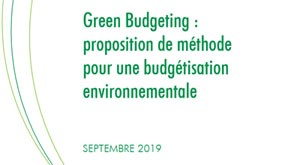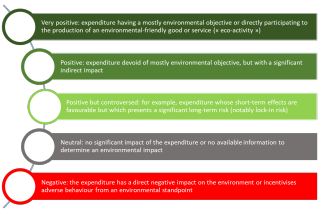
Posted by Dorian Roucher, Claire Waysand and Claude Wendling[1]
In December 2017, France joined the Paris Collaborative on Green Budgeting, an initiative launched by the OECD to assess the compatibility of national budgets with environmental objectives, in particular with respect to climate change objectives. The first step is to take stock of expenditure and revenue having a « significant » environmental impact (either positive or negative).
The French Ministers of Economy, Budget and Environment asked in April 2019 a team from the General Inspection of Finance and General Council for Ecology and Sustainable Development to conduct this stocktaking exercise.
On the revenue side, the work was relatively straightforward. Some degree of consensus exists on what an « environmental tax » means – essentially taxes on energy, waste, transport or natural resources, leading to an increase in relative prices and having an effect on the behavior of economic actors. On this basis, data is published every year for France and other EU countries by the OECD and Eurostat, the EU’s statistical institute. As a total, the team assessed that in 2017 the total yield of environmental-friendly revenues (including some non-tax revenues) was around 35 billion euros.
On the expenditure side, no such consensus exists and many methodologies have been developed. The French statistical institute computes every year the amounts spent by economic actors (general government, businesses and households) for the safeguard of the environment. With regard to the State budget, three budget information documents (on energy transition, fight against climate change and protection of nature) already exist and are produced on a yearly basis. The French debt management agency also discloses information on expenditure eligible for financing by the French « Green bond » (OAT verte). In addition, the team looked for inspiration at the definition of « Green » expenditure proposed by Ireland, Italy or the European Commission.
The methodology elaborated by the team aims at fulfilling three major goals :
- It must be applicable to all types of expenditure, whereas existing methods focus mainly on investment or transfers, seldom on operating expenditures;
- It must take into account the diversity of environmental goals, whereas most existing methods focus on one specific goal (such as climate change or biodiversity); and
- It must take stock of expenditures that have a positive impact on the environment, but also expenditures that have a negative impact.
For this purpose, the team distinguished six major environmental goals, based on a taxonomy of environmental activities currently being discussed at EU level: (i) the fight against climate change, (ii) adaptation to climate change, (iii) sustainable water resource management, (iv) the transition towards a « circular » economy[2] and technological risk prevention, (v) the prevention of pollution, (vi) safeguarding biodiversity and sustainable management of nature, forests and agricultural spaces. The team rated the performance of the French government against each of these goals on a 5-point scale ranging from negative (minus 1) to very positive (plus 3). The chart below presents in more detail the meaning of each of these « ratings ».
Click on the figure for a better image resolution
In order to test this methodology, the team applied it to the 2019 French budget. It focused on four areas of government policy where the environmental impact is most significant (« Territorial cohesion », « Agriculture, food and fisheries », « Ecology and sustainable mobility », and « Research and Higher Education »). The analysis included tax expenditures and expenditures charged to special Treasury accounts financed by earmarked resources, as well as expenditures from around forty supervised entities.
The team estimated that some 55 billion euros of expenditures planned in the 2019 budget were non-neutral from an environmental standpoint. Between 33 and 36 billion euros of expenditures were rated as positive for at least one environmental goal, whereas around 25 billion were rated as negative. Between 4 to 6 billion euros of expenditure had a positive impact on one environmental goal but a negative impact on another. Overall, expenditures with a positive impact on the environment are broadly equivalent to the revenue from environmental taxes, assessed at 35 billion euros in 2017.
The team also estimated that expenditures with a positive impact on climate change (between 26 and 28.6 billion euros) outweighed expenditures with a negative impact (between 17.5 billion and 18.8 billion euros). This made the fight against climate change the objective for which the highest amounts – both positive and negative – of expenditure were recorded.
In presenting the government’s draft budget for 2020, the French Budget Minister announced that this methodology would serve as a basis for preparing a complete « Green Budget » for the year 2021.
The whole report is available (in French) on the website of the Ministry of Finance, under : https://www.economie.gouv.fr/rapport-igf-budget-vert.
[1] Dorian Roucher, Claire Waysand and Claude Wendling are members of the French General Inspection of Finance. Dorian and Claire conducted the mission on green budgeting, whereas Claude is responsible for methodological issues within the General Inspection of Finance.
[2] A « circular » economy is an economic system aimed at eliminating waste and the continual use of resources, through re-use, sharing, repair, refurbishment, remanufacturing and recycling.
The posts on the IMF PFM Blog should not be reported as representing the views of the IMF. The views expressed are those of the authors and do not necessarily represent those of the IMF or IMF policy.







